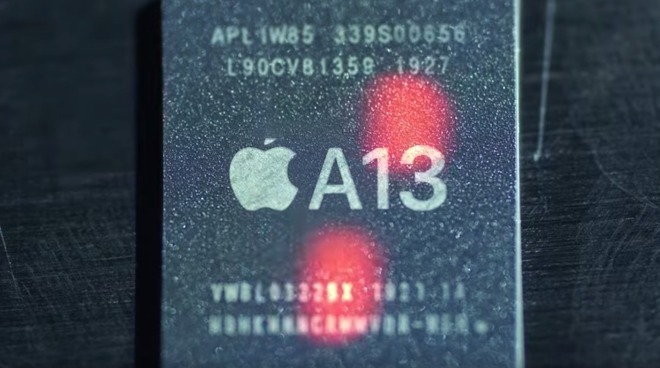WARF fails to convince Supreme Court to reinstate $506M award from Apple
The U.S. Supreme Court has denied an attempt by the University of Wisconsin's Patent licensing arm to try and reverse an appeal from Apple that overturned a $506 million patent infringement ruling, with the court electing not to listen to Wisconsin's arguments.

The A13 Bionic, Apple's latest A-series chip used in the iPhone 11, iPhone 11 Pro, and iPhone 11 Pro Max
On the first day of a new term, the U.S. Supreme Court declined to review a decision by the U.S. Federal Appeals Court to dismiss a patent infringement damages award in 2018, one that was first awarded to the Wisconsin Alumni Research Foundation in 2017. In not hearing the plea, as reported by Reuters, the suit effectively ends with WARF missing out on its damages payment.
The lawsuit started in 2014, where WARF alleged Apple infringed a 1998 "predictor circuit" patent in the A7, A8, and A8X processors, as used in the iPhone 5s, iPhone 6 and Plus, and a number of iPad models. Specifically the violation relates to speculative processing, where the circuit executes instructions it is expecting based on previous instructions given to the processor.
Apple disputed the claim, arguing the chips worked differently than the language of the patent itself.
A 2015 federal jury ordered Apple to pay $234 million in damages in 2015, later upgraded in 2017 to $506.1 million by a judge for Apple continuing to infringe through to the December 2016 expiration of the patent, but Apple called the ruling "fraught with error" and with "prejudicially inflated" damages.
Apple then successfully convinced the U.S. Court of Appeals to overturn the jury decision based on the "plain and ordinary" meaning of the patent, deeming Apple could not have infringed upon it. This led to WARF staging a further appeal to the Supreme Court, on the basis the Federal Circuit incorrectly ignored how the jury understood the patent, along with a request to bounce the case back to the lower court to admit more evidence, an attempt that ultimately failed.

The A13 Bionic, Apple's latest A-series chip used in the iPhone 11, iPhone 11 Pro, and iPhone 11 Pro Max
On the first day of a new term, the U.S. Supreme Court declined to review a decision by the U.S. Federal Appeals Court to dismiss a patent infringement damages award in 2018, one that was first awarded to the Wisconsin Alumni Research Foundation in 2017. In not hearing the plea, as reported by Reuters, the suit effectively ends with WARF missing out on its damages payment.
The lawsuit started in 2014, where WARF alleged Apple infringed a 1998 "predictor circuit" patent in the A7, A8, and A8X processors, as used in the iPhone 5s, iPhone 6 and Plus, and a number of iPad models. Specifically the violation relates to speculative processing, where the circuit executes instructions it is expecting based on previous instructions given to the processor.
Apple disputed the claim, arguing the chips worked differently than the language of the patent itself.
A 2015 federal jury ordered Apple to pay $234 million in damages in 2015, later upgraded in 2017 to $506.1 million by a judge for Apple continuing to infringe through to the December 2016 expiration of the patent, but Apple called the ruling "fraught with error" and with "prejudicially inflated" damages.
Apple then successfully convinced the U.S. Court of Appeals to overturn the jury decision based on the "plain and ordinary" meaning of the patent, deeming Apple could not have infringed upon it. This led to WARF staging a further appeal to the Supreme Court, on the basis the Federal Circuit incorrectly ignored how the jury understood the patent, along with a request to bounce the case back to the lower court to admit more evidence, an attempt that ultimately failed.

Comments
I'd like to know how much the federal and state governments are supporting the school and how the royalties from patents might go back to the tax payer.
It's like someone trying to get a trademark for "Taco Tuesday" when it's used all over the country.
Since Wisconsin (and a number of other states) were routinely cutting funding to their universities it would make sense that those schools would lean more heavily on any other available funding stream...
As for those people who think students and universities shouldn't receive any patents, you're probably the same ones who feel NCAA athletes should only receive a scholarship instead of a piece of the billions of dollars the university and donors make.
Seems to me NIH isn't able to police the abuse of its own policies giving drug company exclusive rights to drugs developed with taxpayer money.
https://research.wisc.edu/intellectual-property/royalty-income-sharing/
Another brainless opinion. The research that leads to the patents that UW licenses are not funded by companies. They are for the most part the product of students, faculty, and researchers who receive grants from the University to perform their work.
Moreover, freely distributing IP would provide zero benefits to UW, its students, and the community that supports UW. To the contrary, it would result in higher tuition and less funds available for research.
Prior to that I spent a couple of years doing Administrative and IT work in a department. We had several faculty members whose whole income was from grants. Private research grants for corporations. they would not have been able to stay at the U without them.